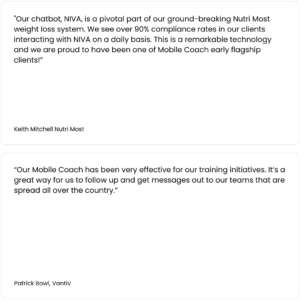Who Uses Chatbots and What Do They Use Them For?
Chatbots are computer programs—generally with personality—that automate conversations through voice or text. Nowadays, chatbots are being implemented at a tremendous rate for both enterprise and consumer markets. In a survey by Oracle of business executives from the Netherlands, South Africa, France and the UK, 80% said they already used or had plans to use chatbots by 2020. So what chatbot users are using them for?
There are simple chatbots that tell you the weather, like Poncho. Of course, there are also more complex chatbots that handle customer service requests. For instance, 1-800-Flowers chatbot for Facebook Messenger is a great example). Moreover, chatbots can do things like onboard new employees.
You can interract with chatbots everywhere, including^
- An electronic travel agent that books Greyhound bus trips right through a phone call
- A digital outdoors expert that answer questions about camping gear through a web chat window at Backcountry’s website
- An all-hours pharmacy assistant that places refill orders
- An always on duty fitness coach that texts reminders, tips, and answers nutrition questions
- An unflappable sales mentor that reinforces training, provides product quizzes, and motivational job performance leaderboards through Facebook Messenger
Business Sphere
Chatbots offer businesses a number of competitive advantages. These advantages can be separated into two broad categories: customer facing and employee facing.
Good examples of valuable customer facing chatbots are easy to find. One example is BB (BlueBot), the KLM Royal Dutch Airline chatbot on Facebook Messenger. BB’s main role is to assist the company’s team of humans working in live support. They interact with over 16,000 customers weekly, reported by MarTech Today. BB help keeping KLM’s passengers up to date with flight information and even assist with booking tickets. BB was able to engage with over half a million customers in its first six months. In addition, with a help of chatbots they were sending close to two million messages. Most people simply want correct, up-to-date information, no matter whether the answers are automated or personal.

Above all, BB give consumers the information they need quickly and easily, all while being cost-effective for the businesses that deploy them.
Chatbots are an excellent resource for the front line of any customer service platform. They excel at providing help desk assistance such as providing answers to FAQ/database based inquiries.
Employee-facing chatbots offer numerous advantages for businesses. They are positioned perfectly to perform the function of employee training, like onboarding new employees. Also, chatbots can even carry out compliance training for topics such as safety, ethics, or diversity and inclusion. Moreover, they are excellent resources to provide access to an internal help desk. It allows employees to access the information they need at any time of day.
The common thread with many successful chatbots is that they do one thing very well. Whether that is telling you the weather or helping you place an order for flowers or pizza, people understand what these chatbots are designed to do.
Here are some other examples of good uses for chatbots:
- Employee Training
- Weight Loss
- User Engagement
- Direct Marketing
- Customer Service
- Sales Enablement
In the last 10 years, some of the best-known chatbots have been personal assistants from tech giants like Apple (Siri – 2011), Google (Google Assistant – 2012), Amazon (Alexa – 2015), and Microsoft (Cortana – 2015). These voice-based chatbots use NLP and sophisticated rules to perform a variety of actions and commands on multiple platforms (mobile devices, smart speakers, thermostats, etc).
The popularity of chatbots has grown tremendously in recent years. We see chatbots all around us, doing all kinds of tasks. With technology like Smart Web Pages, the capabilities of chatbots have grown immensely. When it comes to using chatbots in a professional setting, it is important to clearly define the goals of your chatbot and make sure that the technology is up to the task.
What's Next?
Chatbots are continually getting smarter and more capable. Use cases from personal assistants, customer service, commerce transactions, CBT, and learning all continue to expand and gain greater acceptance into society. Curious about what the future may hold for chatbots? Check out this article to learn more about how chatbots could develop in the next few years!
Get a Demo
Learn how Mobile Coach chatbots will help you drive real engagement with your audience to achieve the key behaviors and results you want.





